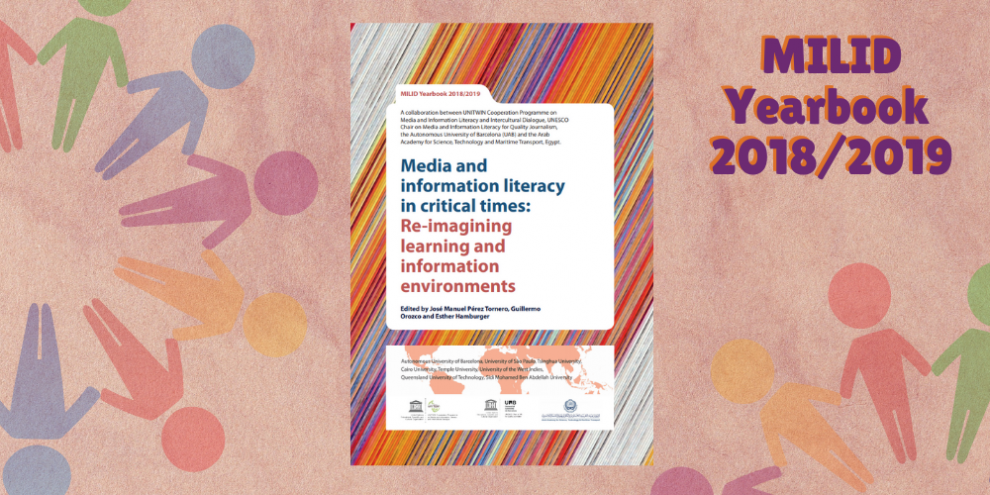In an era when media and information literacy plays a necessary and fundamental role in societies, the UNESCO Chair in Media and Information Literacy for Quality Journalism, in collaboration with the UNITWIN Cooperation Programme on Media Literacy and Intercultural Dialogue and the Arab Academy of Science, Technology and Maritime Transport of Egypt, publishes the MILID Yearbook 2018/2019. Entitled Media and information literacy in critical times: Re-imagining learning and information environments, it shares the reflections, research and analysis of experts and academics from around the world on the topic.
The book, divided into three parts: (I) MIL Augmenting Information Freedom and Knowledge Status, (II) MIL and the Different Actors and Situations of Learning and (III) MIL Providing New Opportunities, compiles a series of articles on fake news, hate speech, intercultural dialogue, education, gender equality and media literacy.
“During the second decade of the 21st century, humanity has experienced a remarkable shift in the cognitive paradigm. The status of information and knowledge has changed. Until now, information and knowledge were personal and individual matters. They depended on personal skills, on individual possibilities to access information and on the ability to criticise, process and memorise it. It is true that the so-called knowledge institutions (schools, universities, publishing and media systems, etc.) contributed to providing a concrete environment for people, improving the conditions for information and knowledge. But today, the state of information and knowledge remains unequal, as well as social, collective and global. This is increasingly dependent on computers, robots and complex systems of knowledge production; which, in turn, are increasingly automated and autonomous,” introduces José Manuel Pérez Tornero, director of the UNESCO Chair in Media and Information Literacy for Quality Journalism, in the first part of the book.
In this first part, José Manuel Pérez Tornero, Santiago Tejedor, Sally Tayie and Cristina Pulido from the Autonomous University of Barcelona; Juan Sakamoto from Hosei University, Japan; Darwin Franco Migues from the University of Guadalajara, Mexico; Alton Grizzle, UNESCO Programme Specialist in Media and Information Literacy, Sumeer Gul, Saba Ali and Aadil Bashir from the University of Kashmir, Srinagar, India; Sheikh Shueb from the Islamic University of Science and Technology (IUST), Awantipora, India; Aabid Hussain from the Department of Information, Srinagar, India; Iram Mahajan from the Islamic University of Science and Technology (IUST), Awantipora, India; Sheikh Shueb from the Islamic University of Science and Technology (IUST), Awantipora, India; Aabid Hussain from the Department of Information, Srinagar, India; Iram Mahajan from Sri Pratap College, Srinagar, India; Huma Shafiq from Government Degree College, Magam, India; and Tariq Ahmad Shah from Central University of Kashmir, Ganderbal, India.
The second chapter of the book focuses on various actors and learning situations within the framework of media literacy. “Real learning processes always need imagination, commitment and respect among the actors involved, motivation and shared interest in the object to be learned, pedagogical strategies, curiosity, communication and analysis, among other things. But learning also needs a situation in which to develop and be meaningful; a situation in which dialogue between learners flourishes and facilitates understanding of each other’s ideas, positions, expectations and judgements. How to develop productive media and information literacy learning situations in different educational settings is the central purpose of the experiences collected in this section,” says Guillermo Orozco, professor at the University of Guadalajara, Mexico, in the introduction to the chapter.
This block contains articles by Spencer Brayton of Waubonsee Community College, Illinois, USA; Natasha Casey and Laura Wiedlocher of Blackburn College, Illinois, USA; Conceicao Costa and Carla Sousa of the CICANT-Lusófona University, Portugal; Kathryn R. Martin Fingar from the University of California Los Angeles, USA; Tessa Jolls from the Center for Media Literacy, Consortium for Media Literacy, Los Angeles, USA; Olunifesi Adekunle Suraj from the University of Lagos, Nigeria; Minna Koponen and Mari Pienimaki from the University of Tampere, Finland; Alexandra Bujokas de Siqueira from the Federal University of Triângulo Mineiro, Brazil; and Danilo Rothberg from São Paulo State University, Brazil.
Finally, the MILID Yearbook 2018/2019 culminates with a chapter that looks to the future and innovation from the new opportunities provided by media literacy. “This third part of the book highlights cases involving formal and informal education, policy-oriented training projects, independent or informal platforms, television content and other powerful MIL studies or projects. The first subsection brings three articles focused on the incorporation of MIL in educational policies,” says Esther Hamburger, professor at the University of São Paulo, Brazil.
Marlene D. Hines, Ministry of Education, Youth and Information, Jamaica; Sonia Livingstone, Patrick Burton, Patricio Cabello, Ellen Helsper, Petar Kanchev, Daniel Kardefelt-Winther, Jelena Perovic, Mariya Stoilova, and Ssu-Han Yu of the Global Kids Online (GKO) project; Moira Toledo Cirello from the University of São Paulo, Brazil; Mami Komaya from Jissen Women’s University, Japan; I V Malhan and Archna Katoch from the Central University of Himachal Pradesh, India; Emelina Galarza Fernández from the University of Málaga, Spain; Rodrigo Gonzalez-Reyes, José Manuel Corona and Guillermo Orozco from the University of Guadalajara, Mexico; Sherri Hope Culver from Temple University, USA; Ana Pérez-Escoda from Nebrija University, Spain; Rosa García-Ruiz from the University of Cantabria, Spain; Ignacio Aguaded from the University of Huelva, Spain; Vedabhyas Kundu from the Gandhi Smriti and Darshan Samiti, New Delhi, India.
The main objectives of the UNITWIN network are to foster collaboration between member universities, to build capacity in each country to empower them to promote media and information literacy and intercultural dialogue, and to support freedom of expression, freedom of information and the free flow of ideas and knowledge. Specific objectives include acting as an observatory of the role of media and information literacy (MIL) in promoting civic participation, democracy and development, as well as enhancing intercultural and cooperative research on MIL. The programme also aims to promote global actions related to MIL and intercultural dialogue. In this context, each MILID Yearbook represents an important initiative to promote and advance these objectives.





